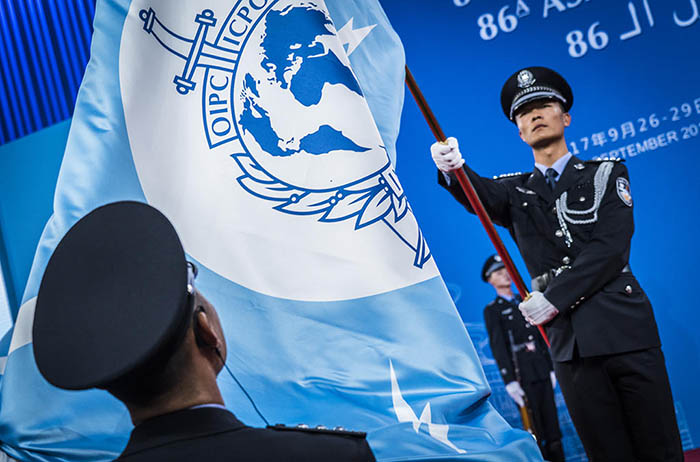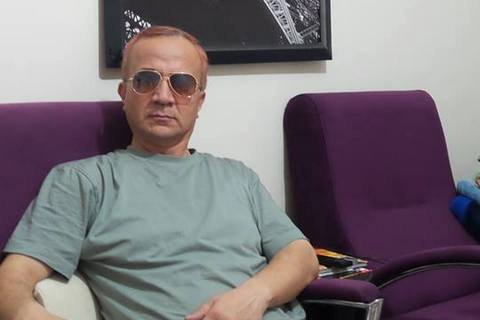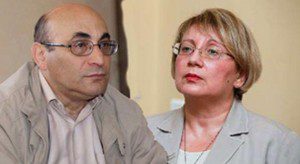29 Sep 2021 | Malaysia, News and features, Statements
[vc_row][vc_column][vc_column_text]
- Clare Rewcastle Brown fears she will be arrested when she arrives in Spain later this week
- Charities have written to INTERPOL today seeking clarification over whether a Red Notice has been issued for her arrest
- On 23 September 2021, the Malaysian Government issued a warrant for her arrest regarding a book about the 1MDB scandal.

British journalist Clare Rewcastle Brown Photograph by Felix Clay
This morning ARTICLE 19, Index on Censorship and Fair Trials wrote to Interpol to request clarification about whether a Red Notice or Diffusion has been issued against the British journalist, Clare Rewcastle Brown. The fourteen undersigned organisations would like to reiterate calls for Interpol to clarify the situation in order to ensure Ms Rewcastle Brown’s unrestricted entry to Spain later this week.
Ms Rewcastle Brown is the founder and editor-in-chief of the Sarawak Report and known for exposing high-level corruption involving the former Prime Minister of Malaysia (popularly known as the ‘1MDB scandal’). In 2015, the Sarawak Report published an article on the diversion of USD 700m into the personal accounts of the prime minister of Malaysia, Najib Razak. Subsequently, Ms Rewcastle Brown faced charges of ‘activities detrimental to parliamentary democracy’, which formed the basis of a Red Notice request by the Malaysian authorities. In August 2015, Fair Trials wrote to Interpol expressing concerns that the Red Notice would likely violate Interpol’s rules. At the time, they took the unusual step of confirming that although a Red Notice request had been received, it was refused by the General Secretariat.
As of 23 September 2021, Ms Rewcastle Brown has been subject to a new arrest warrant in Malaysia. According to media reports, she is wanted over criminal defamation charges brought by the wife of the Sultan of Terengganu regarding statements made about her in Ms Rewcastle Brown’s 2018 book about the 1MDB scandal.
If a Red Notice has been issued, Ms Rewcastle Brown could be arrested when she travels to Spain later this week to visit an elderly relative who needs her support. There is also a risk that she could be held in detention and face extradition to Malaysia.
The undersigned organisations have serious concerns that the Malaysia National Central Bureau might be trying to use Interpol’s systems to judicially harass Ms Rewcastle Brown. The organisations are calling on Interpol to clarify whether there has been an attempt to issue a Red Notice or Diffusion by Malaysia, and whether such an attempt has been successful.
Clare Rewcastle Brown said: “These criminal charges are linked to a civil defamation case and my lawyers believe they represent an abuse of due process to put pressure on me as the defendant against a politically powerful litigant. When the original criminal complaint was brought in 2018 the police declined to action it. However, last month the political party behind the multi-billion dollar 1MDB sovereign wealth fund theft, which lost an election after I had exposed the scandal, returned to office.
“I am concerned that the same actors who tried to abuse Interpol by having me arrested as a terrorist in 2015 will, having returned to power, attempt to file another Interpol Red Notice alert with the aim of having me detained anywhere in the world. They are seeking to paint me as a criminal for exposing their corrupt practices which is my job as a journalist and they are using a claim of ‘criminal libel’ which is simply not a crime that exists in the UK or most democratic countries where the freedom of journalists to report on the politically powerful is rightly protected. I could be thrown into jail at a border by officials who have no idea about the background to this case or the spurious nature of these charges and then face months of legal action fighting extradition charges to get back to Britain.”
Bruno Min, legal director at Fair Trials said: “Some countries will go to extraordinary lengths to quash dissent, including by abusing Interpol Red Notices and Diffusions to harass and intimidate critics, wherever they might be. Interpol must send a clear message to the world that it will not tolerate the misuse of its systems as a tool of oppression by ensuring that journalists and writers like Clare Rewcastle Brown are protected from abusive Red Notices and Diffusions.”
Sarah Clarke, Head of Europe and Central Asia at ARTICLE 19 said: “This latest act of legal intimidation by the Malaysian authorities against Clare Rewcastle Brown is part of a pattern of serious judicial harassment against the journalist as a direct reprisal for her work in exposing massive corruption. Interpol must recognise this as a vexatious act of intimidation and ensure they are not complicit in the abuse of their system.”
Jessica Ní Mhainín, policy and campaigns manager at Index on Censorship said: “It’s an indictment of international policing that a journalist travelling from one jurisdiction to another should fear an arrest for her work, which is overwhelmingly in the public interest. Interpol should take immediate steps to block any efforts by the Malaysian authorities to abuse its systems to harass Clare Rewcastle Brown, and ensure her unrestricted entry to Spain.”
Read the letter to INTERPOL here
Contact: Jessica Ní Mhainín, policy and campaigns manager, [email protected]
SIGNED:
ARTICLE 19
Blueprint for Free Speech
The Daphne Caruana Galizia Foundation
English PEN
European Centre for Press and Media Freedom (ECPMF)
Fair Trials
IFEX
Index on Censorship
International Press Institute (IPI)
Justice for Journalists Foundation
OBC Transeuropa (OBCT)
PEN International
Reporters Without Borders (RSF)
South East Europe Media Organisation (SEEMO)[/vc_column_text][/vc_column][/vc_row]
24 Oct 2017 | Mapping Media Freedom, Media Freedom, media freedom featured, News and features
[vc_row][vc_column][vc_column_text]

Interpol 86th general assembly (Credit: Interpol)
Red notices have become a tool of political abuse by oppressive regimes. Since August, at least six journalists have been targeted across Europe by international arrest warrants issued by Turkey, Azerbaijan, Uzbekistan and Kazakhstan.
“The use of the Interpol system to target journalists is a serious breach of media freedom. Interpol’s own constitution bars it from interventions that are political in nature. In all of these cases, the accusations against the journalists are politically motivated,” Hannah Machlin, project manager for Index on Censorship’s Mapping Media Freedom, said.
In the most recent case on 21 October, journalist and blogger Zhanara Akhmet from Kazakhstan was detained in Ukraine on an Interpol warrant and is currently in a temporary detention facility. Akhmet claims this red notice is politically motivated.
The journalist worked for an opposition newspaper, the Tribune, in Kazakhstan as well as documented human rights violations by the Kazakh authorities on a blog.
On 14 October, also in Ukraine, Azerbaijani opposition journalist Fikret Huseynli was detained at Kyiv Boryspil Airport.
Huseynli sought refuge in the Netherlands in 2006 and was granted citizenship two years ago. While leaving Ukraine, the journalist was stopped by Interpol police with a red notice issued at the request of the Azerbaijani authorities. He has been charged with fraud and illegal border crossing.
Because Huseynli holds a Dutch passport, he cannot be forcibly extradited to Azerbaijan, but he told colleagues he fears attempts to abduct him.
“The arrest of the Azerbaijani opposition journalist by the Ukrainian authorities at the request of the authoritarian government of Azerbaijan is a serious blow to the common European values such as protection of freedom of expression, which Ukraine has committed itself to respect as part of its membership in the Council of Europe and the OSCE,” IRFS CEO Emin Huseynov said.
On 17 October, Boryspil City District Court ruled to imprison Huseynli for 18 days at a pre-trial detention centre, Huseynli’s lawyer announced.
Huseynli’s arrest was the second time in a month that a journalist has been detained in Ukraine on a red notice.
On 20 September, authorities detained journalist Narzullo Okhunjonov, who had been seeking political asylum in Ukraine, under an Interpol red notice when he arrived from Turkey with his family. Okhunjonov writes from exile for sites including BBC Uzbek on Uzbekistan’s authoritarian government. Uzbekistan filed the international arrest warrant for the journalist on fraud charges. He denies the charges against him.
Five days after he was detained, a Kyiv court sentenced Okhunjonov to a 40-day detention while they decide whether to extradite him to his home country. [/vc_column_text][/vc_column][/vc_row][vc_row][vc_column width=”1/4″][vc_icon icon_fontawesome=”fa fa-times-circle” color=”black” background_style=”rounded” size=”xl” align=”right” link=”url:https%3A%2F%2Fmappingmediafreedom.org%2F%23%2F|||”][/vc_column][vc_column width=”3/4″][vc_column_text]
Since 24 May 2014, Mapping Media Freedom’s team of correspondents have recorded and verified 3,597 violations against journalists and media outlets.
Index campaigns to protect journalists and media freedom. You can help us by submitting reports to Mapping Media Freedom.[/vc_column_text][/vc_column][/vc_row][vc_row][vc_column][vc_column_text]Interpol warrants have also been issued in Spain.
Turkish journalist Doğan Akhanlı was detained while on vacation in Spain on 9 August. The journalist has lived in Cologne since 1992 where he writes about human rights issues, particularly the Armenian Genocide, which Turkey denies.
Turkey charged Akhanlı with armed robbery which supposedly occurred in 1989. After the charges were brought against him in 2010 and he was acquitted in 2011, the Supreme Court of Appeals overturned his acquittal and a re-trial began. Akhanlı faces “life without parole”.
Two weeks later, Interpol removed the warrant and Akhanlı was released. The decision was made after German chancellor Angela Merkel denounced the abuse of the Interpol police agency: “It is not right and I’m very glad that Spain has now released him. We must not misuse international organisations like Interpol for such purposes.”
Markel claimed Erdogan’s use of the international agency for political purposes was “unacceptable”.
Akhanlı’s detention came two weeks after Turkish journalist Hamza Yalçın was detained on 3 August at El Prat airport in Barcelona, where he was vacationing, Cumhuriyet reported. He holds a Swedish passport and has sought asylum there since 1984.
Yalçın is being accused of “insulting the Turkish president” and spreading “terror propaganda” for Odak magazine of which he was the chief columnist, according to a report by Evrensel.
Like Ukraine, Spain’s member state status in the Council of Europe also arises the question of their activity in the arrests of Akhanlı and Yalçın. “The latest cases of arrests of journalists in Ukraine and Spain on the basis of Interpol red notices … have extremely worrying implications for press freedom,” Rebecca Vincent UK Bureau Director for Reporters Without Borders, said. “Interpol reform is long overdue, and is becoming increasingly urgent as critical journalists are now at risk travelling even in Council of Europe member states”.
Turkey’s recent continued persecution of journalists through Interpol also reached as far as Germany. A Turkish prosecutor has requested the Turkish government issue a red notice through Interpol though it is unclear if it went through.
On 28 September 2017, the Diyarbakir Prosecutor’s Office filed an application to seek an Interpol red notice for Can Dündar, the former Editor-in-chief of Turkey’s anti-regime newspaper, Cumhuriyet. The demand for a red notice is based on a speech made by Dündar in April 2016, supposedly supporting the “terror propaganda” of the outlawed Kurdistan Workers’ Party (PKK).
Dündar fled Turkey for Germany in 2016.
On the same day, Peace Research Institute Oslo (PRIO) nominated Dündar and the Cumhuriyet newspaper for the Nobel Peace Prize.
“Turkey is no exception to using this system just as is Russia, Iran, Syria, and its close neighbour and ally Azerbaijan among other governments, where political direction does not necessarily align with democracy, respect for human rights and basic freedoms,” Arzu Geybulla, an Azerbaijani journalist and human rights activist said. “Targeting its citizens who have escaped persecution and have been forced to flee as a result of their opinions, is a worrying sign especially at a time, when over 160 journalists are currently behind bars in Turkey and thousands of people have lost their jobs, been arrested or currently face trials in the aftermath of the July coup.”
Although PACE has adopted a resolution condemning the abuses of Interpol red notices, a review of Interpol’s red notice procedure has yet to be adopted. Amid criticism from human rights activists, journalists, and even leaders like Angela Merkel, it is unclear if Interpol will make a change to their red notice regulations.[/vc_column_text][vc_row_inner][vc_column_inner][/vc_column_inner][/vc_row_inner][/vc_column][/vc_row][vc_row][vc_column][vc_basic_grid post_type=”post” max_items=”4″ element_width=”6″ grid_id=”vc_gid:1509034712367-374920af-c5df-6″ taxonomies=”6564″][/vc_column][/vc_row]
29 Sep 2017 | Campaigns -- Featured, Media Freedom, media freedom featured, Statements
[vc_row][vc_column][vc_column_text]
Index on Censorship urges Ukraine to not extradite journalist Narzullo Okhunjonov to Uzbekistan where he faces prosecution.
On 20 September authorities detained Okhunjonov when he arrived at an international airport in Kyiv, Ukraine, following an Interpol red notice.
Uzbek authorities issued an international arrest warrant on fraud charges against Okhunjonov, who denies the charges.
A Kyiv court then approved a 40-day detention period for the journalist, the limit under an Interpol notice.
Okhunjonov along with his wife and five children were seeking political asylum from the Ukrainian authorities. The journalist has been living in exile in Turkey since 2013 in order to avoid politically motivated persecution for his reporting.
“This abuse of the Interpol system is a direct violation of Article 2 of its constitution and a clear effort to silence critical journalists,” Hannah Machlin, project manager of Index on Censorship’s Mapping Media Freedom platform, said. “We call on the Ukrainian authorities to allow Narzullo Okhunjonov to remain in Ukraine, grant him political asylum and reject requests to extradite him to his home country.”
Okhunjonov writes in Uzbek and Russian for media outlets including BBC Uzbek on topics such as Uzbekistan’s authoritarian government and has criticised by the late president Islam Karimov.
The journalist’s family is currently residing in Kyiv.
The Council of Europe’s parliamentary assembly published Resolution 2161 in April 2017 on the abuse of the Interpol system. The resolution underlined that “in a number of cases in recent years, however, Interpol and its Red Notice system have been abused by some member States in the pursuit of political objectives, in order to repress freedom of expression”.
In August, two exiled Turkish journalists, Hamza Yalçın and Doğan Akhanli, were detained in Spain following Interpol red notices from Turkey. Both are no longer facing extradition. [/vc_column_text][/vc_column][/vc_row][vc_row][vc_column][vc_basic_grid post_type=”post” max_items=”4″ element_width=”6″ grid_id=”vc_gid:1506702230284-c0425a2a-f87f-6″ taxonomies=”6564″][/vc_column][/vc_row]
13 Jun 2017 | Azerbaijan, Azerbaijan Letters, Campaigns, Campaigns -- Featured, Statements
[vc_row][vc_column][vc_column_text]

Arif and Leyla Yunus (Photo: HRHN)
Dear Secretary General,
We, the undersigned organisations call on Interpol, and all other relevant bodies and authorities to act with due diligence in accordance with Interpol’s constitution to prevent the misuse of Interpol alerts against Leyla Yunus and Arif Yunus, two prominent human rights defenders from Azerbaijan. The couple currently resides in exile in the Netherlands, where they were granted refugee status in 2016. Detailed information about their human rights activism can be found below. Interpol’s constitution prohibits the misuse of its systems for political purposes and in ways that violate human rights.
Leyla and Arif Yunus were arrested on 30 July and on 5 August 2014 respectively. Azerbaijani authorities prosecuted both on politically motivated charges of large-scale fraud, while also charging Leyla with bogus forgery, tax evasion, and illegal entrepreneurship offences. In August 2015, a court sentenced Leyla Yunus to eight and half years imprisonment, and Arif Yunus to seven, having convicted them of tax evasion and other economic crimes. Authorities also filed treason charges against them both, but later suspended the investigation.
On 9 December 2015, Leyla Yunus was released from detention and her eight-and-a-half-year prison sentence was converted into five-year suspended sentence, following a decision by the Baku City Court of Appeal on the basis of a request from her lawyers with reference to her deteriorating health condition. Similarly, Arif Yunus’s prison term was changed to a five-year suspended sentence. He was placed under house arrest on 12 November 2015. In April 2016 the Azerbaijani government allowed the couple to travel abroad to receive needed medical treatment for conditions they had developed during their prison ordeal.
Due to the politically motivated nature of their prosecution, in spring 2016 the couple received political asylum in the Netherlands.
When Leyla and Arif left Azerbaijan, their cassation appeal was still pending before the Supreme Court. On 27 December 2016, the Supreme Court sent the case back for re-examination to the Baku Appeal Court. On 17 May 2017, at the hearing at the Baku Appeal Court, the Yunus’s lawyer asked the court to ensure the couple’s participation in the proceedings via internet. The court rejected the petition. The same day, the court ordered the couple to return to the country to participate in the subsequent court hearings in their case. The court hearing was rescheduled from 31 May to 3 July 2017.
The arrest of Leyla and Arif Yunus happened against the backdrop of a rapidly deteriorating human rights situation in Azerbaijan. Since 2014, several dozens of human rights defenders, lawyers and journalists and opposition politicians have been arrested and prosecuted on politically-motivated grounds. The arrests and other steps by the government of Azerbaijan have served to severely close the space for independent activism, critical journalism, and opposition political activity in the country.
Azerbaijan has been ranking as Not Free in the Freedom in the World rankings of the Freedom House for several years, scoring the lowest on the political rights and civil liberties. In the latest Freedom of the Press rankings, Azerbaijan scored the 162nd place out of 180 countries.
The United Nations Working Group on Arbitrary Detention recently concluded an official visit to Azerbaijan. In a statement issued at the end of its visit, the Working Group concluded that human rights defenders, journalists, and political and religious leaders continue to be detained on criminal or administrative charges in the country as a way to impair their exercise of basic human rights and fundamental freedoms and to silence them. The Working Group stressed that these practices constitute abuse of authority and violate the principle of the rule of law that Azerbaijan has undertaken to comply with. One of the cases highlighted by the Working Group is that of Leyla and Arif Yunus. In his recent report to the Human Rights Council, the United Nations Special Rapporteur on human rights defenders, Michel Forst also drew attention to the legal persecution of human rights defenders in Azerbaijan.
An official request has been made to Interpol on 12 June 2017 by the European Human Rights Advocacy Centre (EHRAC), which represents the couple, to inquire about the existence of any alerts made against Leyla and Arif Yunus by the Azerbaijani Government and to request Interpol to take all appropriate steps to prevent the dissemination of such an alert. Taking into consideration the very poor human rights record in Azerbaijan and the routine practice of politically-motivated prosecutions by the authorities, any attempt by the Azerbaijani authorities to use Interpol alerts against Leyla Yunusova and Arif Yunusov would violate the prohibition in Interpol’s constitution against the misuse of its systems for political purposes and in ways that violate human rights. Interpol should, therefore, refuse any request from the Azerbaijani authorities to use the Interpol Information System against Leyla Yunusova and Arif Yunusov, and we call on all relevant national bodies and authorities not to act on Interpol alerts against them, in case they are issued.
Short biographies:
Leyla Yunus is a long time human rights defender and activist since the late Soviet era. She is the director of the Institute for Peace and Democracy, a human rights organisation in Azerbaijan that focused on political prisoners, women’s rights and other issues. For almost 30 years Leyla Yunus and Arif Yunus have been involved in compiling comprehensive lists of political prisoners in Azerbaijan. Leyla Yunus is a Knight of the French Legion of Honor, winner of the International Theodor Hacker award, Laureate of the Polish Sergio Vieira de Mello Award and a finalist of the 2014 Sakharov Prize of the European Parliament.
Arif Yunus is a prominent Azerbaijani historian and human rights activist. He is the chairperson of the Conflict and Migration departments at the Institute for Peace and Democracy. Throughout his career, Arif has published over 30 books and several articles on the history of Azerbaijan and on Azerbaijani-Armenian relations. In his work, he has promoted dialogue between intellectuals from Azerbaijan and Armenia, and for many years has advocated for a peaceful resolution of the conflict in Nagorno-Karabakh. He has supported numerous victims of torture and spoken out repeatedly against politically motivated detentions.
The list of signatory organisations:
1. Amnesty International
2. Association UMDPL (Ukraine)
3. Bir Duino
4. Centre for the Development of Democracy and Human Rights
5. Committee Against Torture
6. Crude Accountability
7. Fair Trials
8. FIDH and OMCT under “Observatory for the protection of human rights defenders”
9. Freedom Files
10. Front Line Defenders
11. Helsinki Foundation for Human Rights
12. Human Rights House Foundation
13. Human Rights Watch
14. Index on Censorship
15. International Partnership for Human Rights
16. Institute for Reporters’ Freedom and Safety (IRFS)
17. Kazakhstan International Bureau for Human Rights and the Rule of Law
18. KRF Public Alternative
19. Legal Policy Research Centre
20. Public Verdict
21. Regional Center for Strategic Studies
22. The Barys Zvozskau Belarusian Human Rights House
23. The Georgian Centre for Psychosocial and Medical Rehabilitation of Torture Victims
24. The Netherlands Helsinki Committee
25. Women of the Don[/vc_column_text][/vc_column][/vc_row][vc_row][vc_column][vc_basic_grid post_type=”post” max_items=”12″ style=”load-more” items_per_page=”4″ element_width=”6″ grid_id=”vc_gid:1497944614160-ae286e6b-fd24-9″ taxonomies=”7145″][/vc_column][/vc_row][vc_row full_width=”stretch_row_content_no_spaces” content_placement=”middle”][vc_column][vc_single_image image=”91122″ img_size=”full” alignment=”center” onclick=”custom_link” link=”https://www.indexoncensorship.org/2017/05/stand-up-for-satire/”][/vc_column][/vc_row]




